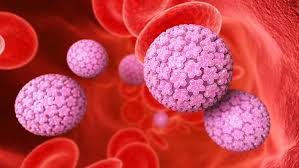
HPV (human papillomavirus), the generic name of a group of viruses that encompasses more than one hundred different types, can cause the formation of warts on the skin and oral regions (lips, mouth, vocal cords, etc.), anal, genital and urethra. Genital lesions can be high risk because they are precursors of malignant tumors, especially cervical and penile cancer, and low risk (not related to cancer).
Transmission occurs predominantly sexually, but there is the possibility of vertical transmission (mother/fetus), through saliva, self-infection and perforation or cutting infection with HPV-contaminated objects.
HPV infection can be asymptomatic or cause warts to appear similar to that of a small cauliflower on the skin and mucous membranes. If the change in the genitals is discrete, it will be perceived only by specific tests. If they are more severe, virus-infected cells can lose natural controls over the multiplication process, invade neighboring tissues, and form a malignant tumor such as cervical and penis cancer.
In most cases, HPV does not cause symptoms and is spontaneously eliminated by the body. However, 30 to 40% of existing HPV types can affect the genital areas of both sexes, causing lesions such as genital warts and precancerous changes in the cervix. The form of treatment should be chosen taking into account the age of the patient, the type of HPV, the extent and location of the lesions.
Once the diagnosis is made, it is necessary to perform the treatment of the disease that can be clinical (with medications) or surgical: chemical cauterization, electrocauterization, cryotherapy, laser or conventional surgery in cases of installed cancer.
HPV can be diagnosed through gynecological examination and laboratory tests such as Pap smear, colposcopy, peniscopy, and anuscopy. Differential diagnosis should be made with other lesions or other infectious diseases and neoplasms.
To avoid HPV contamination, the following care is recommended:
* Use of male condoms, for all types of sexual intercourse;
* Use of a female condom;
* Quadrivalent vaccine (prevents against HPV 6,11,16 and 18) or bivalent (prevents against HPV 16 and 18);
* Routine preventive examination (Pap smear);
* Avoiding smoking, excessive drinking and using drugs, as these activities weaken the body's defense system, making the person more susceptible to HPV.
Using a condom in all sexual intercourse is very important to prevent the transmission of
HPV and other diseases. In the case of HPV, there is also the possibility of contamination through skin contact with skin, and skin with mucosa. This means that any sexual contact – including oral sex and masturbation – can transmit the virus. Contagion can also occur through clothing and objects, which makes the vaccine a relevant element of prevention, as well as the prevention and joint treatment of the couple.
Condom use is the indispensable measure of health and hygiene not only against HPV infection, but as a prevention for all other sexually transmitted infections. Consult the gynecologist regularly and have the prescribed tests from the beginning of the sex life.
Living with any disease requires responsibility. Often receiving a diagnosis of a sexually transmitted disease has a very negative emotional impact. Therefore, it is important to do the recommended gynecological follow-up and follow the treatment according to medical guidance. Early diagnosis and treatment always count points in favor for patients.